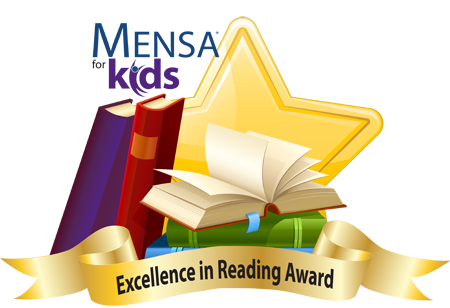Summer vacation is a special time for kids; there might be trips to the beach, water parks, endless popsicles, and most importantly, a break from school. However, that break can also lead to learning loss.
Have you been looking for things to do to keep kids cognitively challenged this summer and avoid the dreaded summer brain drain? Want to do it without breaking the bank? It’s easier than you think to turn your home into a place of fun and learning.
Here are the Mensa Foundation’s top seven tips for avoiding summer brain drain:
TED Talks are a perfect (and free) way to open your child’s mind. To help parents and teachers use TED talks with kids in interactive ways, we’ve created TED Connections — guides to TED talks appropriate for kids with high-level thinking questions and companion activities.
Be sure to check out TEDed, TED’s youth-specific video series. They’ve taken lessons by some amazing teachers and professionally animated them, creating an engaging blend of video and animation guaranteed to hold a student’s attention. The videos have lessons that accompany them as well. Create a free account and track your child’s progress as they learn.
Whether you’re watching a TED Talk, a TEDed lesson, or following along with one of our TED Connections, here are some questions you can ask your child to get them thinking critically:

Even kids who dread reading during the school year can enjoy reading for pleasure over the summer. Work with your kids to select books they will like and aim to read at least 20 minutes a day to grow their stamina and fluency.
The Mensa Foundation’s Excellence in Reading program is the perfect summer reading program for youth of all ages. Divided into grade-level bands, the program guides young readers through the world’s greatest literature. When a child completes a reading list, the Mensa Foundation sends him or her a free T-shirt and certificate. No registration is required, and kids can complete any or every list they like, regardless of age. Best of all, there is no deadline.
There’s no need to limit yourself to just one reading list. You can find summer reading programs through Half Price Books, Scholastic, and even Pizza Hut! Your local library may also have their own summer reading program, so be sure to check there as well.
It’s easy for adults to forget how essential language arts skills are to building literacy and creating confident readers. That’s why it’s important not only to read consistently and frequently, but to practice their writing and vocabulary as well.
Encourage your child to keep a daily writing journal. For preschool through kindergarten-aged children, you can simply use a one- or two-word prompt and have your child draw a picture of what that word means to them. For older children, strike a balance between their skill and interest level. If your child is writing-resistant, even one sentence a day is a fantastic goal – any writing is better than none! Got a kiddo who is crazy about writing? Check out some flash fiction and story-telling prompts to get their creative gears turning.
Looking for other ways to expand your child’s vocabulary? Here are some ideas:

While summer reading initiatives may be more common, it’s equally important for kids to keep their math skills sharp during summer. Luckily, there are simple things you can do at home to incorporate math into your summer break routine.
First, a book: Family Math by Jean Kerr Stenmark et al. is the gold standard in both helping families use common household items to develop math skills as well as creating a welcoming home environment for mathematical exploration.
Next, a blog: Let’s Play Math! is a perfect place for a parent (or teacher) to find thoughtful, engaging math to do with young people.
Finally, a website: Khan Academy is the place to go for high-quality math instruction in snack-sized bags. There are free courses available from pre-K through college for kids to work through at their own pace.
For those who need clever ways to make math more palatable, here are some suggestions:
Besides encouraging curiosity and learning, going outside and exploring new places is a natural way to get your children thinking about social studies. Travel isn’t necessary – these are all activities your child can do in your local area.
Have kids design a brochure about your neighborhood, including lore, stories, maps, and photos. Research your home’s history using city or county records. Ask longtime residents about how your neighborhood has changed over the years. They may even be able to share old photos. Kids can use those and any other photos they take to create a community virtual history and tour on historypin.

They can also design a guided walking tour of your neighborhood, selecting interesting features to point out (the widest driveway, the best yard, the biggest dog, etc.) and give the tour to guests.
Contact your local convention and visitor’s bureau to get the information you would receive if you were coming to town on vacation. Besides just going to see places you haven’t seen before, have the kids create a “Welcome to our Neck of the Woods” brochure or guidebook for future guests, including reviews based on your travels and a history of your area. If you live in a rural area with no real tourist information, all the better. Create it and then share it! No matter where you live, there are things worth seeing and doing.
To really get moving, have your child pick a destination they’d like to visit. This could be a local ice cream shop, toy store, or even a theme park. Map out the distance from there to your house and set a goal to “walk” there. Keep track of the distance your child walks this summer, and once they’ve reached their goal, take them to their destination as a treat!
Hobbies are an important part of self-expression, and summer is the perfect time to start doing them. Not only that, having special interests gets kids excited about learning, reduces stress, and develops skills like goal setting, decision making, and problem solving. Not sure where to start? Here are some low-cost hobbies that are worth picking up:
The best hobbies lead to the creation of items of lasting value, can be learned fairly easily, and match the child’s natural temperament, so keep your child’s unique interests in mind when nudging them in any direction.
Volunteering connects kids with their communities and teaches them that children are capable of effecting change in the world. It also encourages problem solving, communication, and cooperation with others. Get your kids into the habit of volunteering while they are young so it is second nature by the time they apply for scholarships!
Volunteer service can be done as an organized group effort or as an individual personal project. Here are some ways that kids and families can donate their time:
Still looking for more? Check out the Mensa Foundation’s Bright Kids Pinterest board, which has resources and activity suggestions for bright kids (and their parents). Have fun and keep learning!